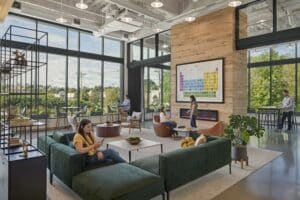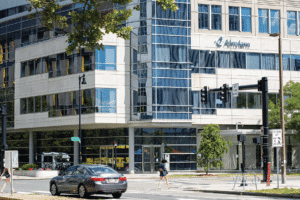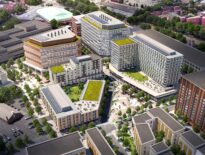
Suburban lab conversions such as Lexington’s Revolution Labs responded to the pandemic-induced decline in office leasing. Now the life science industry’s slowing growth. Photo courtesy of Robert Benson Photography
The lab and life science market in Greater Boston and across the nation might be cooling off, but there are still some tailwinds benefiting suburban office-to-lab conversions that were set in motion in recent years.
At 10 Maguire Road in Lexington, a 42,000-square-foot lease from SalioGen Therapeutics in September represented the seventh tenant to commit to the Revolution Labs project.
The Cambridge-based biotech is slated to join other tenants like Thermo Fisher Scientific and Nikon Instruments at the conversion project by Greatland Realty Partners and Chicago-based Singerman Real Estate. Greatland Realty Partners is also pursuing an office-to-lab conversion at Riverside Labs, a former Liberty Mutual office campus in Weston. Natick-based biotech firm ModeX inked a 33,056-square-foot lease for Riverside Labs earlier this year.
Bedford Labs – a 288,000-square-foot office-to-lab conversion project developed by a Redgate, Optimum Asset Management and AEW Capital Management partnership – delivered to market this month fully leased to Sarepta Therapeutics.
But experts and even executives involved with some of these projects caution this isn’t some silver bullet for office landlords looking for windfalls amid dreary conditions in commercial real estate.
“It’s a little bit like ‘A Tale of Two Cities’: the best of times and the worst of times – or, if not best, at least pretty good times,” Kevin Sheehan, a co-founder and managing partner at Greatland, said. “From my perspective, the leasing market for lab space in our primary market –our portfolio is focused on the central Route 128 suburban market – is pretty good.”

The headquarters of drugmaker Alnylam in Cambridge’s Kendall Square. Companies leasing space in suburban office-to-lab conversions can find big discount on rent over trophy buildings in the industry’s hub neighborhoods. iStock photo
A Mid-Tier Solution with Savings
The life science sector, Greater Boston’s commercial real estate bread-and-butter in recent years, saw negative absorption for the second consecutive quarter over the last three months, according to CBRE’s third-quarter report. Greater Boston’s life science market saw 445,000 square feet of new supply come online between the start of July through the end of September.
It’s only the fourth quarter over the last five and a half years where Greater Boston’s life science sector saw negative absorption. East Cambridge, home to Kendall Square, took the biggest hit last quarter, accounting for 68 percent of the negative absorption in the entire Greater Boston life science market.
Some of the success with the suburban office-to-lab conversion interest outside the typical life science hubs like Kendall Square and the Seaport might have to do with pricing: Converted class B office-to-lab space typically rents for significantly less than trophy assets in East Cambridge.
“It’s been great for lab users that are looking for a sort of a mid-tier solution,” said Mike Ogasapian, a vice president at R.W. Holmes Commercial Real Estate.
Life science tenants might find savings anywhere from 15 to 20 percent after rent and tenant improvements at a converted office project compared to a new, customized ground-up project, Ogasapian added. But life science developments, either new-build or conversions, already underway with secured financing are likely to be the only new projects to deliver for some time.
Higher interest rates are making the capital markets environment too difficult to get much of anything greenlit.
“It’d be very challenging to get to investment committees today on new ground-up construction or conversions on a very capital-intensive industry that has a robust pipeline of projects already underway,” said Aaron Jodka, director of research for U.S. capital markets at brokerage Colliers.
It’s not all bad news. A JLL third quarter report of Greater Boston’s life science market notes midsize growth requirements are beginning to grow across the region. September was the best for venture capital fundraising in the life science space in 18 months: JLL reports $1.3 billion was raised last month. But the brokerage also notes it’s the slowest leasing market in a decade.
Given the kind of capital market fundamentals currently playing out, it’s likely to be a favorable climate for tenants – even with a spate of new leases at office-to-lab conversions in the suburbs – for some time.
“There is a light at the end of the tunnel,” Ogasapian said. “It’s just that it’s going to be a long tunnel.”




 |
| 
